'We started during the pandemic, we didn't expect to still be here'
The inspiring kitchen volunteers tackling food poverty in Edinburgh one meal at a time
Michael Innes is a man on a mision.
A chef for more than 20 years, he worked at Michelin-starred establishments, including Celler de can Roca, in Catalonia, and Barcelona’s Dos Palillos. But he swapped cooking for some of the richest people in society for helping some of the poorest in Edinburgh.
Today, he works as operations and advocacy lead at Empty Kitchens Full Hearts, a charity which has just finished delivering 300,000 pre-packed meals across the city over the last year. They are one of two charities that I spent time with hearing how they are tackling the food crisis in the Capital head on.
Their approach, Innes explains, is simply, “if someone asks for food, we give them food with no judgments made.”
Empty Kitchens, Full Hearts was founded by chefs and other hospitality workers in the first weeks of lockdown to use surplus food and feed people in need. At its pandemic peak, it was delivering meals to 1500 people a day.
The immediate need created by the pandemic may have gone, but in meeting that need the hospitality workers who stepped up to help discovered another one - the staggering number of people still going hungry every day in our Capital city.
‘I had just been living in total ignorance’
Having started with the charity as a volunteer delivery driver during the pandemic, Emily Gifford is now its fund raising manager. She points out: “A lot of our staff members were once volunteers. As soon as I walked in the doors here, I could feel the amazing sense of community. People are just trying to do something good for their neighbours and community.”
After becoming involved she soon discovered the eye-opening scale of the problem in Edinburgh. She acknowledges: “I guess I had just been living in total ignorance about the scale of poverty in this city and how difficult the lives of people, who are living a couple of streets away from me are. I was so struck by what Empty Kitchens Full Hearts were doing and how much they were helping people. And I felt like I needed to get more involved.”
Earlier this year the Joseph Rowntree Foundation reported more than one million people across Scotland live in poverty, with nearly half of those (490,000) living in extreme poverty. Edinburgh has an estimated child poverty rate of 19.5%, with Scotland overall facing a child poverty rate of 24%. With stark figures like this, having access to food is of paramount importance.
“It's not just a case of just dropping food off, we have a service user engagement team, who follow up with people, building up relationships to understand their circumstances to see if there's other help and support we can point them in the direction of. We try to make sure that we're helping in as many different ways as we can.”
Sometimes people just need help in the short term until they're in a new job or they have moved from temporary to permanent accommodation or until their benefits get sorted. Others are experiencing health problems, so the charity will provide food until they are back on their feet.
“We've heard directly about the difference that the food we provide has been making, that it has been a lifeline at a time of need.”
Two million meals
On the wall of the charity’s West Granton Road base is proudly displayed the total meals delivered, since 20th April 2020 - the total stood at 1 968 824 when I visited. They aim to have supplied two million meals within the next few months. The pandemic crisis may be over but the charity’s core values remain true and the food they provide is still desperately needed due to the increased cost of living.
Innes, from Morningside, says: “There are still lots of people who don't have the resources to cook. There are all sorts of ways we can help people fill up kitchens and fill plates and bellies. There are many reasons why people need help with food, but we also see people in long-term permanent employment who are not earning enough to make ends meet. Often both poor physical and mental health compound their situations.”
The charity’s base for catering operations is located in West Granton where they have a professional kitchen, packing hall, office space and a community garden and serve a hot meal every Friday lunchtime. The meals they make come from donated food and are packed in two-day ration packs, which are delivered to people's homes.
He says: “As we're cooking at such a huge scale every day we can take things in bulk from places like Fareshare that other organisations can’t.” In addition, local businesses including Twelve Triangles, Stephens Bakery, Company Bakery and Mimi's Bakehouse do their bit and offer them surplus.
Gifford also explains: “We also have relationships with other community organisations like Hibernian Community Foundation, on Easter Road, who operate as hubs for us. So the meals get delivered there and people can pick them up in their local area. The idea is that that's encouraging people to get out and about, and also they can make use of what other stuff might be going on.
“If someone needs help with food, it's not going to be the only thing that is a challenge for them. If you are worrying about where your next meal is coming from, it is unlikely you’ll be able to deal with any other things.
“We're so glad to offer support when people are going through what are such challenging times, but it is really hard to hear the stories of people who are living in such difficult circumstances. We are here to help for as long as they need our support.”
Picking up the pieces of public funding cuts
Empty Kitchens Full Hearts has around 300 regular volunteers but Gifford stresses: “We're always looking for more people to help. We see a lot of regular faces, you can tell what day of the week it is by who is in.”
Innes explains as a member-led charity: “We ask service users if they would like to volunteer once they're in a better place. If you're a volunteer, you can become a member, and any member can become a board member so there is an opportunity to become part of the running of the organisation.”
People can get involved across the organisation in various ways, in the kitchen, packing, delivering or administration. They have also launched a winter fundraising appeal the aim is to raise £15,000 to help support their service users.
Innes points out: “It’s not cheap to feed 600 people a day, so we're always very grateful for donations and people spreading the word about that campaign.”
In the kitchen, I watch as chef Fi Grant and volunteer Jason Russell make 150 litres of soup, and then prepare giant trays of roast vegetables. After the meals are made, they are portioned and then packaged into two-day packs with help from volunteers. Everything gets labelled with contents, heating instructions and allergy risks, to ensure that everything is documented and safe.
Innes says it is not just simply about providing food, they also operate a pathway into employment for people who are volunteering in the kitchen, to maybe think about a career as a chef or in hospitality.
Innes says: “While they volunteer here in our supportive environment they can learn basic kitchen skills, and enrol on a course at Edinburgh College to gain a fully recognised qualification. Most people have gone on to more courses or are employed in hospitality, which is amazing.”
One of those willing to volunteer her time is Susan King who started in April 2021 she has recently been promoted to become a packing manager. She explains: “I heard about a friend who started volunteering, it's an amazing charity. I've met a lot of new friends, and the actual organisation makes you feel very welcome. I have volunteered in other places before but here you feel valued and like you're making a difference. There are a lot of people here that volunteer long term so they must be doing something right.”
Innes explains: “We started as a short-term solution during the pandemic, but we weren't expecting to still be here. However, due to the cost of living crisis, people are still in need of support. And that's not going to end anytime soon.
“Unless we see large amounts of funding getting diverted into social infrastructures, then charities like us will be left to pick up the pieces for the lack of public sector funding.”
Helping young people realise their potential
The research published by the Joseph Rowntree Foundation also shows that child poverty varies drastically across Edinburgh, ranging from one in twenty children living in poverty in more affluent areas to one in four in the areas with the highest child poverty rates. Scran Academy is another charity using food to tackle the attainment gap caused by this.
It was founded in 2017 by John Loughton winner of Celebrity Big Brother in 2008. He went on to become a political campaigner and motivational speaker. At one of his TED Talks, he discussed his education at Craigroyston High in Muirhouse, and as a result, reconnected with his old home economics teacher, Elaine Gray. The pair went on to found the groundbreaking project together.
Acting CEO Will Bain describes what Scran Academy does. “We are a poverty-busting organisation, using food and cooking to deliver education and employability programmes. Our core aim is to help young people who need it the most, who are most susceptible to falling through the cracks in the education system, allowing them to gain access to the experiences and opportunities that are so often denied them.
“Food provides a fantastic tool for learning, with lots of different ways to engage young people with learning and development.”
He explains more about their mission. "We want to see every young person, regardless of background or barrier, realise their full potential in learning, work and life. Too many young people in our most challenged communities never realise their talents or aspirations due to the effects of social inequality and poverty.
“The food choices we inevitably make are worse for us if we've got less money and damage our mental and physical health. I became interested in how a lot of good food is culturally unavailable to people who are experiencing lower income deprivation.”
Scran Academy delivers a school-age youth education working with Craigroyston High, Tynecastle, Broughton High, Currie and Royal High and other schools. They identify young people who are struggling with mainstream education with the help of teachers, social workers, and other referrers. They could be young people who aren’t leaving their bedrooms or are getting into trouble and are at risk of joining gangs or having issues with substance abuse.
These young people aged 14+ come to Scran Academy two days a week for up to two years and are supported in gaining qualifications in food hygiene. They also help run the charity’s catering enterprises, the Scran Van and Scran Café at NHS Lothian’s Comely Bank Centre where they find out what it takes to run a business.
Bain explains that their youth work approach means they can develop soft skills with young people. It also delivers a taste of reality as they need to understand how catering works and how to manage budgets.
“The young people are being asked to take on responsibility which has consequences. We trust them with that and that's as empowering as it gets. This is a business with customers at the end, and the money they make feeds back into the programmes.”
They also run an employability programme for those aged 16 +, called Scransitions. Over six weeks or longer youngsters take part in weekly placements in the cafe or the van again supported by staff. Through a mix of group work and one-to-one support Scarn Academy staff build confidence and help them achieve. Bains adds: “We teach them practical cooking skills they can apply to their life. We have had several young people going to college, and others have gone on to jobs. We support them over a longer term, we make sure we are there at the end of the phone and continue our connection.”
To date, they have directly supported nearly 100 people to make positive changes.
Changing the narrative
Bain has previously worked in restaurants and cafes as a chef and in management. He also graduated from MSC Gastronomy at Queen Margaret University. It was there he discovered his passion for helping people and gained a greater understanding of how food impacts health inequalities in Scotland. Afterwards, he realised he wanted to work with people rather than just working exclusively with food.
Scran Academy is instigating a tutoring programme which will begin in April and is looking for volunteers who are interested in supporting young people with revision and homework.
Bain says: “Schools are seeing unprecedented levels of challenging behaviour, with young people not engaging in lessons and being disruptive, but our longer-term strategic plan is to develop our SQA delivery further and help reduce the poverty-related attainment gap.”
The Scran Academy wants to change the expectation that young people from certain areas are not going to have the same sort of opportunities. Bain stresses: “It's about changing the expected narrative.”
They are currently on the hunt for volunteers. We’re looking for people with a broad range of skills, ideally those who have got some professional cooking experience, tutoring or teaching, leadership development, or confidence building skills. The bottom line is you must have a non-judgmental understanding approach if you want to volunteer with us. You have to be compassionate.
“When you hear about people who can't afford the next meal in the city, that is hard and harrowing. But it makes us more determined as a team, to do all we can for the young people that we support.”



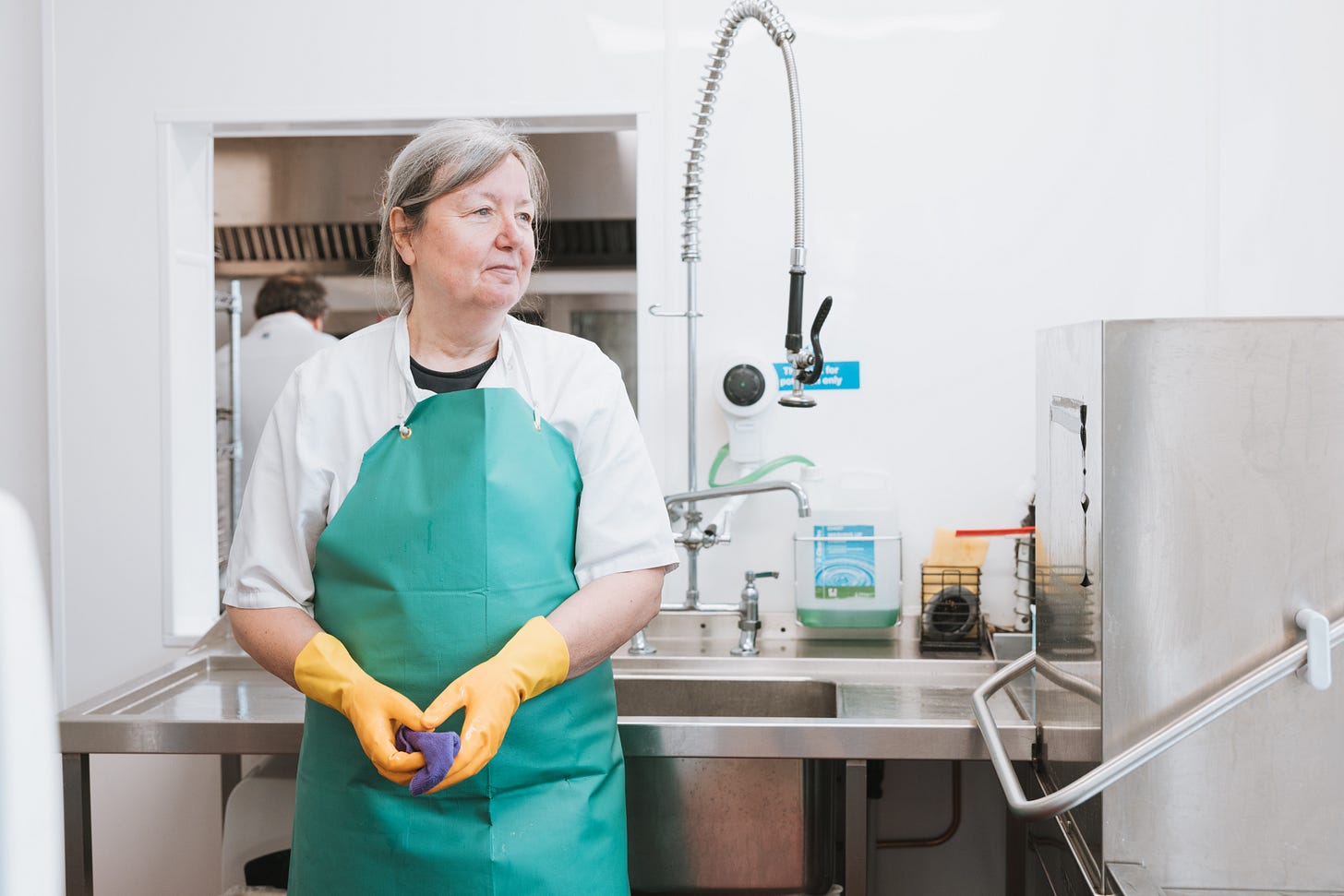
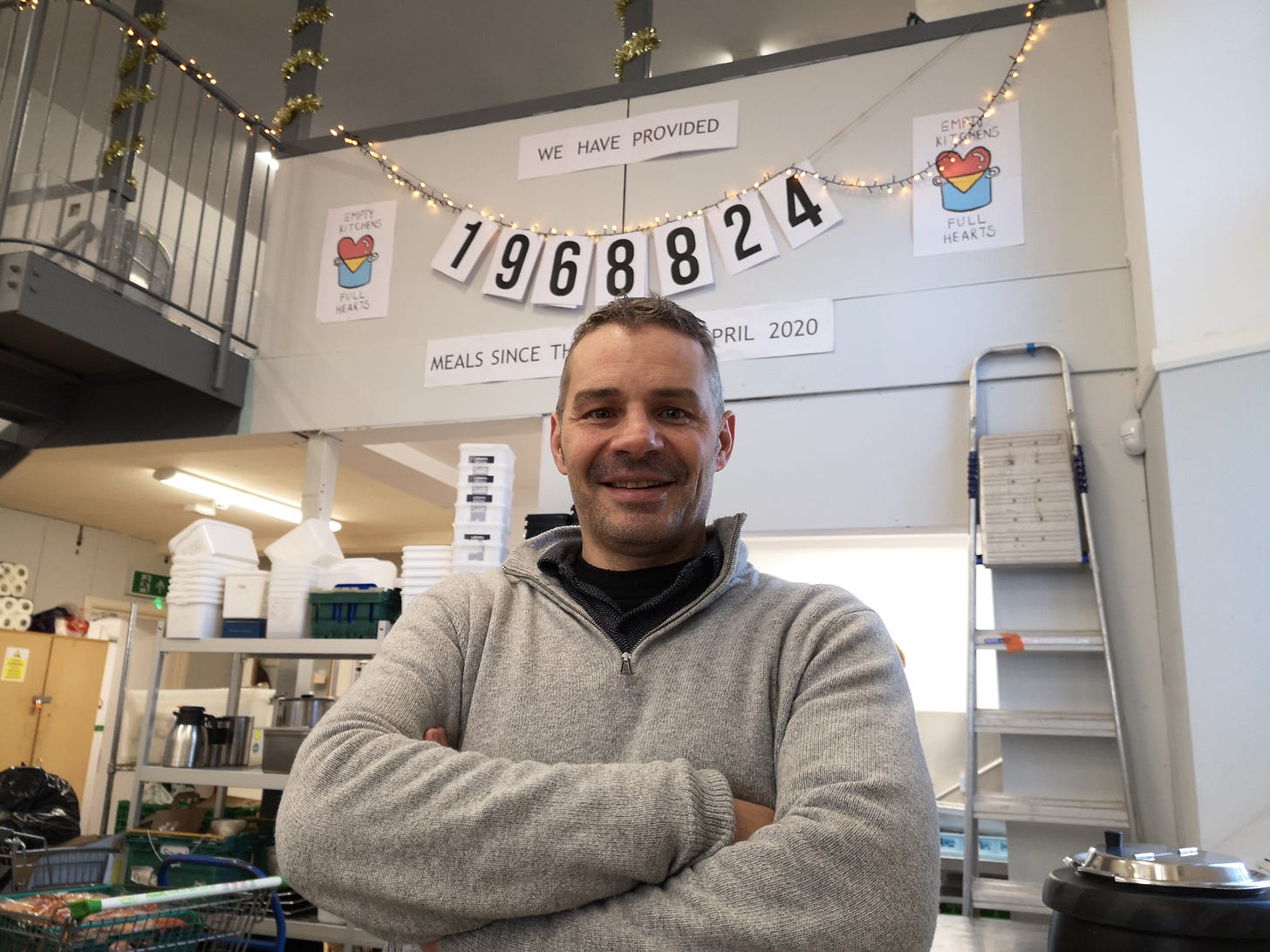
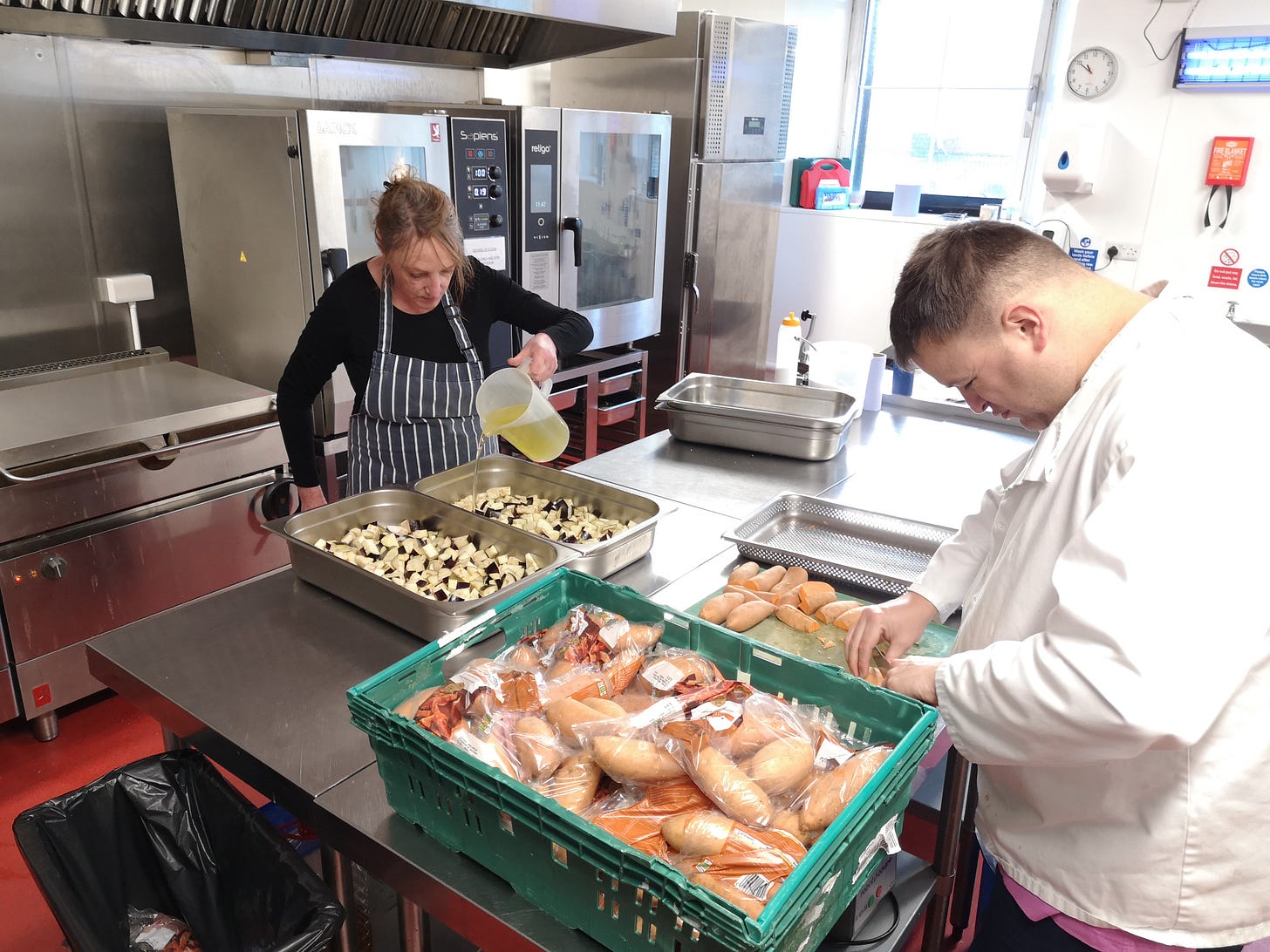
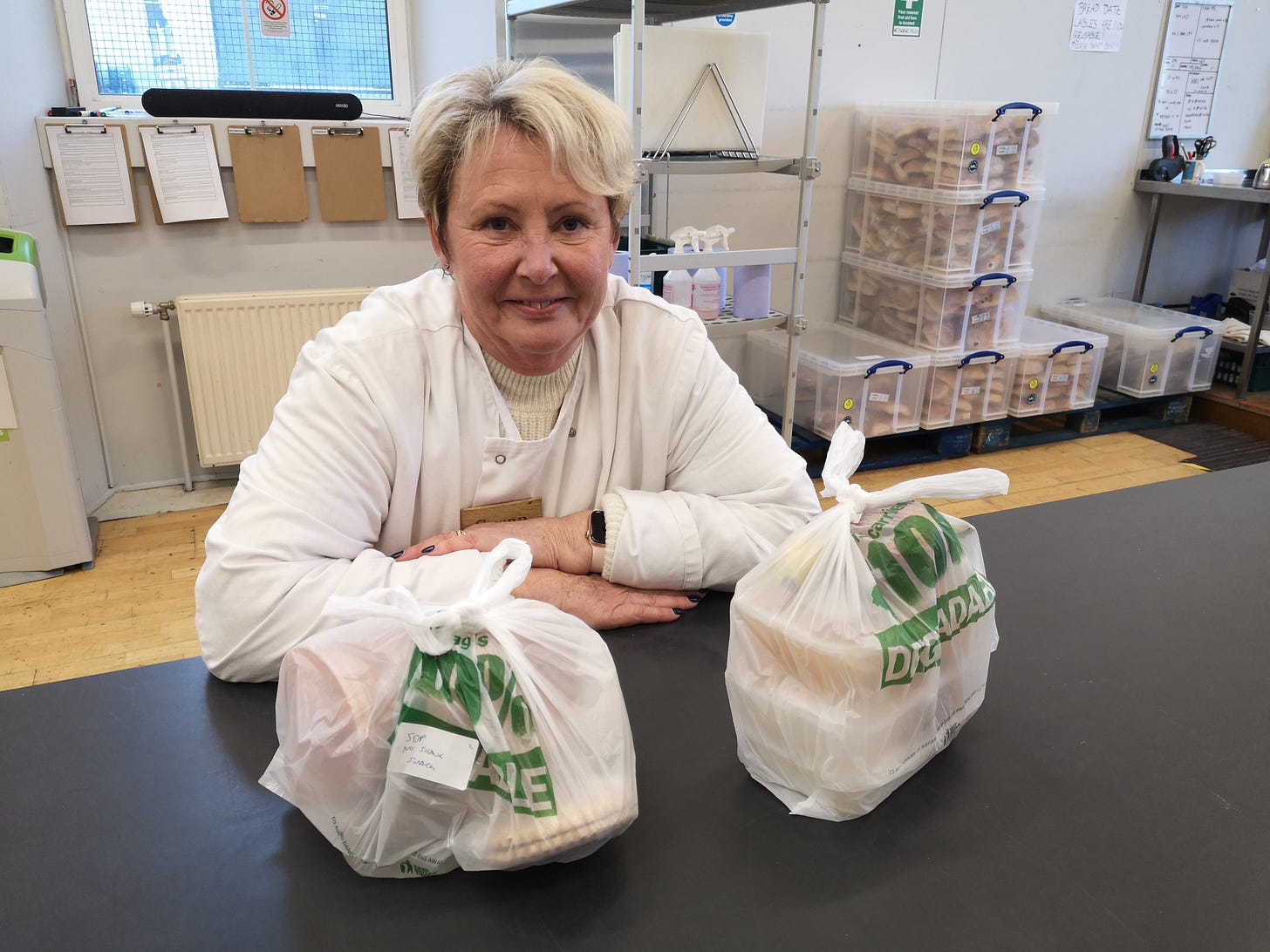


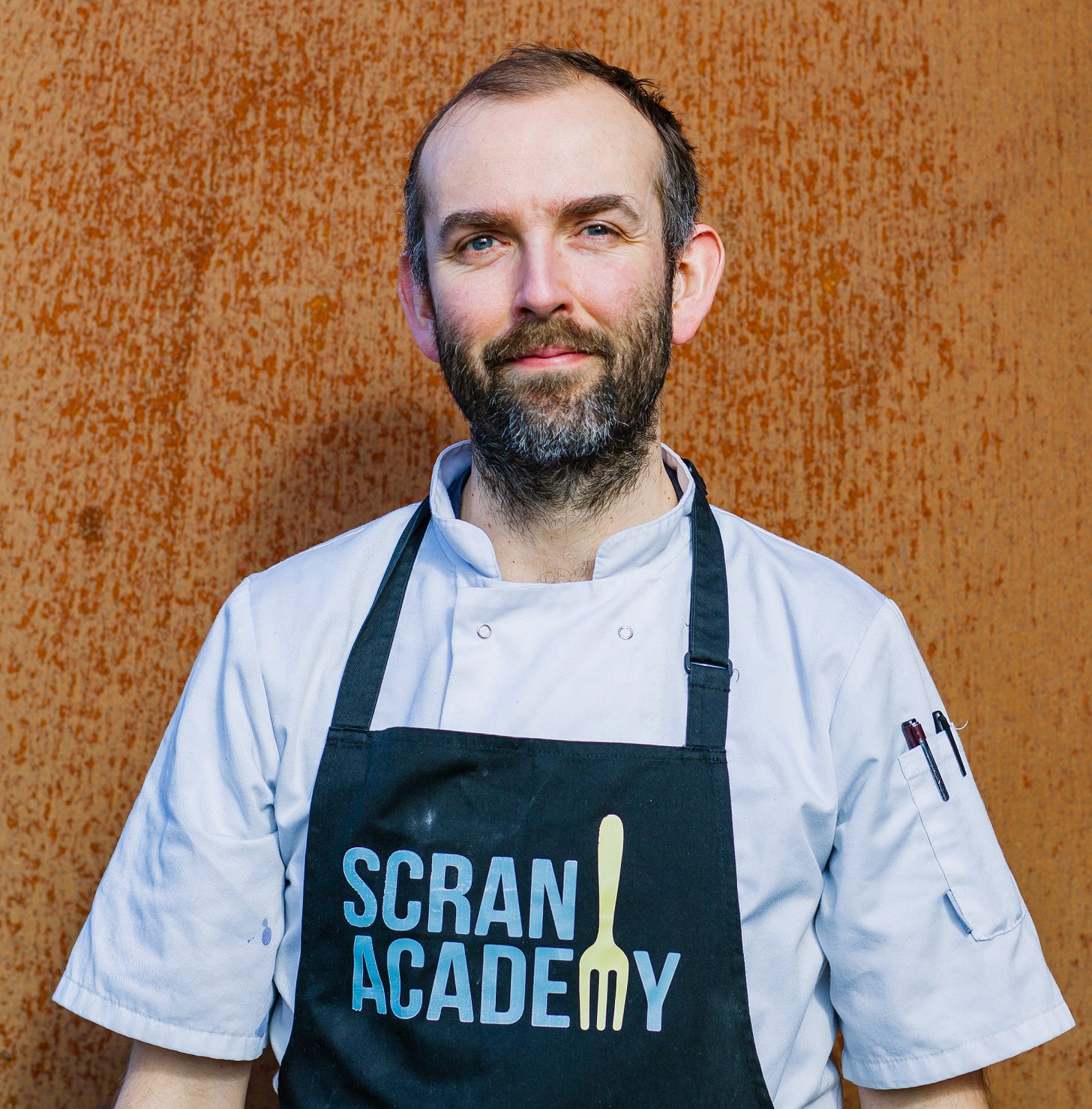

Inspiring, fascinating and depressing. How have we come to being a society with such high levels of poverty and need? And with seemingly little appetite to tackle causes rather than symptoms?